In today's fast-paced digital world, language evolves at an incredible speed, giving birth to new words and phrases almost daily. Slang, by its very nature, is a dynamic and informal aspect of communication, constantly shifting and adapting to reflect cultural trends, technological advancements, and generational nuances. From the simple "wyd" to the more complex "cheugy," understanding these informal expressions is crucial for navigating modern conversations, whether online or offline. But what happens when a seemingly innocuous term like "Eiffel Tower" enters the realm of slang, taking on a meaning far removed from its iconic Parisian landmark?
This article delves into the intriguing, and often explicit, world of "Eiffel Tower slang." We'll explore what this particular phrase means in its informal context, trace the broader landscape of how slang emerges and spreads, and provide insights into why understanding such terms is more important than ever. Whether you're a language enthusiast, a parent trying to keep up with teen talk, or simply curious about the quirks of modern English, prepare to unpack a term that might surprise you, and learn how to navigate the ever-expanding lexicon of contemporary slang.
Table of Contents
- The Ever-Evolving Tapestry of Slang
- Unveiling the Meaning of 'Eiffel Tower Slang'
- The Origins and Spread of Explicit Slang
- Why Understanding Slang is Crucial for Effective Communication
- Navigating the Digital Lexicon: For Parents and Educators
- The Broader Landscape of Internet Slang
- When to Use (and When to Avoid) 'Eiffel Tower Slang'
- Mastering the Art of Modern English
The Ever-Evolving Tapestry of Slang
Slang words are defined as the words and phrases used informally in any language. They are the linguistic shortcuts, the inside jokes, and the cultural markers that bind specific groups of people together. Every generation has its own slang — very informal language or specific words used by a particular group of people. You'll usually hear slang spoken more often than you'll see it in formal writing, though the internet has certainly blurred those lines.
Consider terms like "lmao," "rof," or "brb" – these are prime examples of popular internet acronyms that have become ubiquitous in online communication. Or perhaps you've heard "wyd," an acronym whose meaning you might instinctively grasp if you're active online. These terms highlight how quickly language can adapt to new communication mediums, prioritizing speed and conciseness. The "Data Kalimat" provided earlier underscores this point, listing numerous examples of commonly used English slang words today, from "btw" to "yw," demonstrating their widespread adoption in informal contexts.
The beauty and complexity of slang lie in its fluidity. What's "dank" today might be "cheugy" tomorrow. Understanding this constant flux is key to staying current with language. It's not just about memorizing definitions; it's about grasping the underlying cultural currents that give rise to these terms. This constant evolution means that even seemingly straightforward words can take on entirely new, sometimes surprising, meanings, as is the case with "Eiffel Tower slang."
Unveiling the Meaning of 'Eiffel Tower Slang'
When you hear the phrase "Eiffel Tower," your mind likely conjures images of Paris, romance, and an iconic architectural marvel. However, in the realm of modern slang, particularly within certain informal or adult contexts, "Eiffel Tower slang" takes on a vastly different, and explicitly sexual, meaning. It's a term that illustrates how common nouns can be repurposed to describe specific, often vulgar, acts.
What the Term Actually Describes
In its slang context, "Eiffel Tower" refers to a specific sexual act involving three people. Typically, it describes a scenario where two men are performing oral sex on one woman simultaneously, with the men positioned on either side of the woman's head, and their legs lifted and spread, forming a triangular shape that is said to resemble the structure of the Eiffel Tower. This visual comparison is the basis for the slang term.
Context and Connotation
It is crucial to understand that "Eiffel Tower slang" is highly explicit, vulgar, and almost exclusively used in very informal, often crude, conversations. It is not a term you would encounter in polite company, formal discussions, or mainstream media unless the context specifically demands a description of such an act. Its usage often implies a certain level of sexual explicitness or a desire to shock or provoke. For those unfamiliar with the term, encountering it without context can be confusing or even offensive, highlighting the importance of understanding the nuances of slang.
The term's existence underscores how human creativity, even in its most informal and boundary-pushing forms, constantly reinterprets existing language to describe new experiences or concepts. While the act itself is not new, giving it a widely recognizable, albeit crude, moniker like "Eiffel Tower slang" allows for quick, albeit coarse, communication among those who understand its informal meaning.
The Origins and Spread of Explicit Slang
The evolution of explicit slang, including terms like "Eiffel Tower slang," often follows similar patterns to more innocuous informal language. These terms typically originate within specific subcultures or communities, whether online forums, adult entertainment industries, or specific social groups where such discussions are common. Once coined, they spread through word-of-mouth, social media, and increasingly, through online dictionaries and urban lexicons.
The internet plays an undeniable role in the rapid dissemination of such terms. Platforms like Reddit, anonymous image boards, and even private messaging apps can act as incubators for new slang. A term might start as an inside joke among a small group but, if catchy or descriptive enough, can quickly gain traction and become more widely recognized. Online slang databases, like the one mentioned in our "Data Kalimat" that offers an "urban thesaurus" and "offensiveness ratings," serve as informal archives for these evolving lexicons, making them accessible to a broader audience who might be searching for the meaning of an unfamiliar term. This accessibility, while helpful for understanding, also means that explicit terms can reach individuals who might not be prepared for their content.
The anonymity and perceived freedom of online communication often encourage the creation and use of more explicit or boundary-pushing language. Without the immediate social repercussions of face-to-face interaction, individuals might feel more comfortable experimenting with or adopting terms that would be considered taboo in other settings. This environment contributes to the proliferation of terms like "Eiffel Tower slang," which, while understood by a segment of the online population, remain highly inappropriate for general use.
Why Understanding Slang is Crucial for Effective Communication
Beyond simply knowing what "Eiffel Tower slang" means, the broader lesson here is the importance of understanding slang in general. Language is a living entity, and slang is its most vibrant, informal heartbeat. For students, travelers, or anyone who wants to speak English in a more natural way, mastering 120+ English slang words across categories like Gen Z, pop culture, and travel can significantly boost language skills and comprehension. It's not just about vocabulary; it's about cultural fluency.
Misunderstandings can easily arise when one party uses slang that the other doesn't comprehend. Imagine trying to follow a conversation where terms like "cheugy" or "dank" are thrown around, and you're left scratching your head. This gap in understanding can lead to awkward moments, misinterpretations, or even social exclusion. Understanding slang allows you to grasp the full context of a conversation, appreciate humor, and connect more authentically with native speakers or specific communities.
Furthermore, slang often reflects underlying social attitudes, values, and trends. By studying slang, linguists and sociologists can gain insights into generational shifts, subcultural identities, and the evolving norms of communication. Even explicit terms like "Eiffel Tower slang," while not for everyday use, offer a glimpse into certain aspects of human expression and the ways in which language adapts to describe all facets of life, even the most private or taboo.
Navigating the Digital Lexicon: For Parents and Educators
The rapid emergence of new slang terms, especially those originating from internet culture, presents unique challenges for parents and educators. An essential guide for parents and teachers is made to help you understand teen slang words used at home and in the classroom. If you don't know these 50 Gen Z slang words, watch out—you might be "cheugy"! This highlights the generational divide in language and the need for adults to stay informed.
Bridging the Generational Gap
For parents, understanding terms like "wyd," "ily," or even more obscure internet acronyms is not just about being "cool"; it's about fostering open communication with their children. When a child uses a term that a parent doesn't understand, it can create a barrier. Being aware of popular internet slang terms, phrases from popular culture, and other weird sayings/acronyms allows parents to better interpret their children's conversations, online activities, and emotional states. It can also be a gateway to discussing more sensitive topics, as understanding the language of a generation is often the first step towards understanding their world.
Promoting Safe Online Environments
Beyond simple communication, knowing about slang, including explicit terms like "Eiffel Tower slang," is vital for online safety. Children and teenagers are constantly exposed to a vast array of content online, and some of it can be inappropriate or harmful. If a parent or educator encounters a term they don't recognize, especially in a context that seems concerning, knowing where to find definitions (like an online slang dictionary) can be crucial. This knowledge empowers them to identify potential risks, initiate necessary conversations about online behavior, and guide young people towards safer internet practices. It’s about being proactive rather than reactive, ensuring that children are equipped to navigate the complexities of online language responsibly.
The Broader Landscape of Internet Slang
The term "Eiffel Tower slang" exists within a much larger ecosystem of internet slang. Our online slang database, as one resource puts it, is the "dankest!" This vibrant, ever-changing lexicon includes everything from simple acronyms to complex memes and culturally specific phrases. Have you ever heard the term "wyd"? Or perhaps "imao"? These are just a few examples of how internet culture has spawned its own unique dialect.
This lesson helps you understand the meaning of these slang acronyms with interesting examples. What does it mean when someone texts you "ily"? If you're confusing the meaning of this trendy acronym, congrats, you're turning the right page. What does "btw" mean and stand for? In this lesson, you will learn the definition, other meanings, and conversation examples of the acronym "btw" in English. "Yw" is a popular internet acronym that is widely used by almost everyone; it's casual and quick to use in informal situations.
These examples illustrate the functional aspects of internet slang: it's about efficiency, community, and often, humor. While "Eiffel Tower slang" falls on the more explicit end of the spectrum, it shares the characteristic of being a shorthand for a specific concept, understood by a particular group. The sheer volume of new terms means that even native speakers can feel lost without a guide. A dictionary of real slang words, such as an online slang dictionary, becomes an indispensable tool for deciphering these linguistic puzzles, offering definitions for popular slang and trending words, phrases, and emojis.
When to Use (and When to Avoid) 'Eiffel Tower Slang'
Understanding the meaning of "Eiffel Tower slang" is one thing; knowing when and where to use it (or, more accurately, when to *avoid* it) is another entirely. Given its explicit and vulgar nature, this term is almost universally inappropriate for public, professional, or even casually social settings. Its usage is confined to very specific, highly informal, and often adult-oriented contexts where all parties are aware of and comfortable with its explicit meaning.
Using such a term out of context can lead to significant social repercussions, including offending others, being perceived as crude or unprofessional, or even facing disciplinary action in certain environments. The general rule of thumb for any explicit slang is to exercise extreme caution. If there's any doubt about the appropriateness of a term, it's always safer to err on the side of caution and choose more universally understood and polite language. While it's important to be aware of the existence of terms like "Eiffel Tower slang" for comprehension purposes, active usage should be reserved for very specific, private contexts where all participants are consenting adults and fully understand the implications of the language being used.
This principle extends to much of internet slang. While "lmao" might be fine in a text to a friend, it's unlikely to be appropriate in a professional email. Context is king, and understanding the social boundaries of language is a hallmark of effective and respectful communication. Knowing the full spectrum of English slang, from the innocuous to the explicit, empowers individuals to make informed choices about their linguistic expression.
Mastering the Art of Modern English
The journey through the world of slang, from common internet acronyms to specific, explicit terms like "Eiffel Tower slang," highlights the incredible dynamism of the English language. It's a language constantly reinventing itself, absorbing new influences, and adapting to the ever-changing ways we communicate. This article, about 500 of the most common slang words in English along with their simple meanings, is perfect for students, travelers, and anyone who wants to speak English in a more natural and contemporary way. It's about more than just definitions; it's about cultural immersion.
Ultimately, understanding slang isn't about endorsing every term, especially those that are vulgar or offensive. Instead, it's about equipping yourself with the knowledge to navigate complex conversations, comprehend diverse forms of media, and avoid misunderstandings. By staying informed about the evolving lexicon of slang, you empower yourself to be a more effective, nuanced, and culturally aware communicator in today's interconnected world.
So, the next time you encounter an unfamiliar term, whether it's a new Gen Z phrase or something as explicit as "Eiffel Tower slang," remember that language is a puzzle waiting to be solved. Embrace the curiosity, consult reliable resources, and continue to explore the fascinating, ever-expanding universe of English. What other slang terms have you encountered that left you scratching your head? Share your experiences in the comments below!
Related Resources:



Detail Author:
- Name : Mr. Giovanny Torp
- Username : amina84
- Email : kulas.rachelle@hartmann.net
- Birthdate : 1977-05-28
- Address : 39443 Heathcote Mall West Ruben, PA 66635
- Phone : +12815806446
- Company : Hoppe, Schuster and Cremin
- Job : Utility Meter Reader
- Bio : Similique est odit exercitationem. Optio quo quod consectetur in cumque occaecati.
Socials
tiktok:
- url : https://tiktok.com/@wittingc
- username : wittingc
- bio : Aliquid cumque voluptas tempore suscipit eum aliquid.
- followers : 4989
- following : 1361
twitter:
- url : https://twitter.com/witting2020
- username : witting2020
- bio : Et quas modi sed odit. Neque id laborum aliquid voluptas fuga iure dicta. Maxime tempora dolor voluptatem.
- followers : 4877
- following : 2756